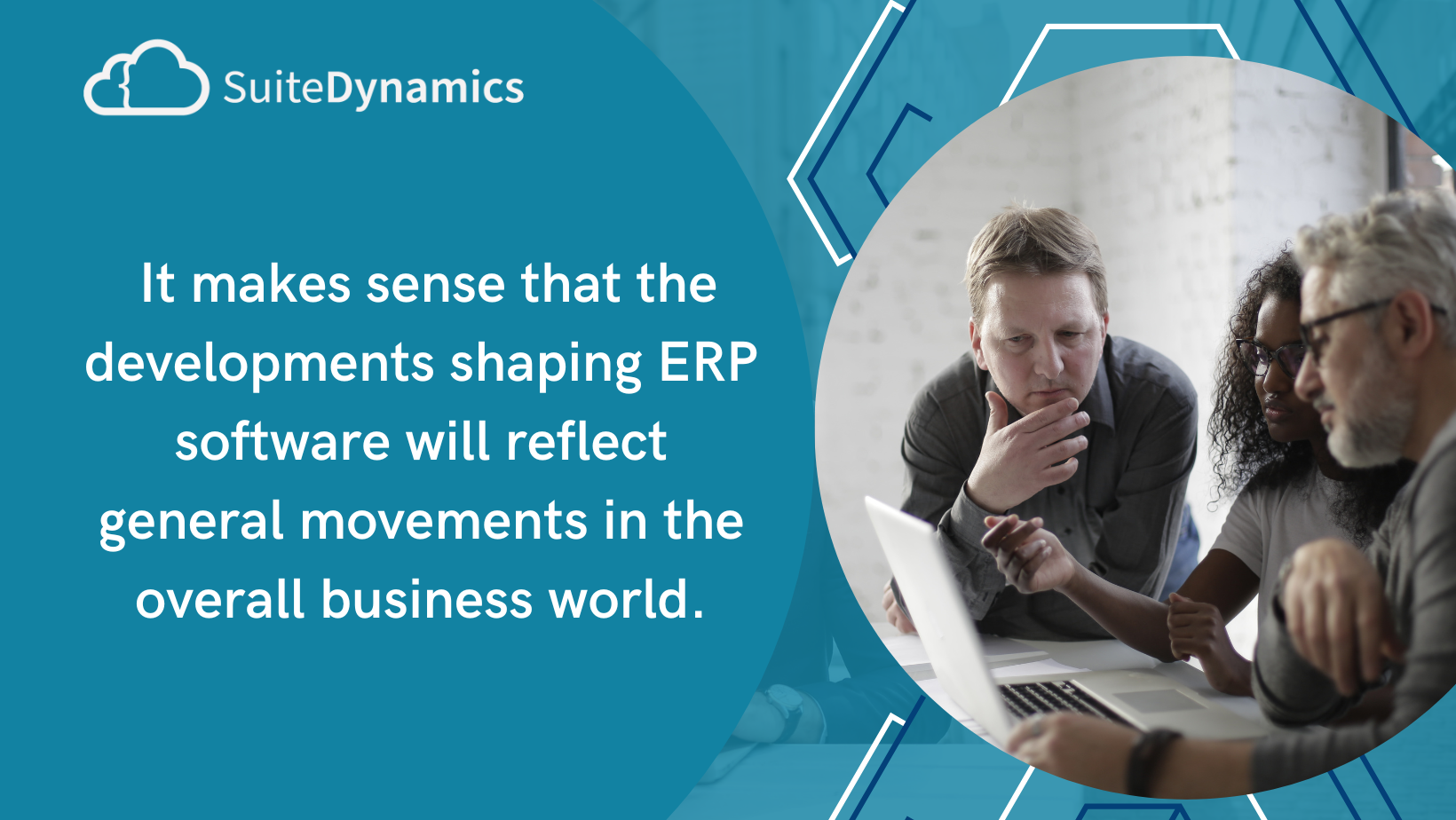Which ERP trend will impact your business the most in 2023?
As 2023 progresses, we expect ERPs to evolve in line with the changing business world. Here's what we think will happen.

Why should you care about an ERP trend? Because technology is constantly changing and shaping the business world. And Enterprise Resource Planning software has been at the forefront of that evolution for years.
In fact, Technology Evaluation Centers reports that nearly 50% of companies are planning for, actively acquiring, or upgrading an ERP system. And according to Market Research Engine, the global ERP market will exceed $49.5 billion by 2027.
Therefore, it makes sense that the developments shaping this software will reflect general movements in the overall business world. So, let’s look at a few significant ERP trends for 2023.
1. Mobile apps will become more powerful.
Users don’t want to be trapped at their desks anymore. Instead, they want to travel, visit clients, monitor warehouses, or just work from home. That’s why mobile compatibility will remain a significant ERP trend in 2023.
Software vendors have been working on several key features that users can access through mobile devices. For example, NetSuite has developed a mobile app that can:
- Track billable hours.
- Maintain a NetSuite calendar.
- Log expenses and attach receipts.
- Maintain records.
- Monitor important business information.
- Track business calls and assign them to companies and customers.
One size doesn’t fit all in the ERP world.
And at SuiteDynamics, we believe this list is just a kickstart for NetSuite’s mobile capabilities. As we all know, technology has a phone-sized future, and we expect this fact to guide ERP software development.
2. More businesses will consider a cloud-based system one of the best ERP solutions.
Mobile compatibility goes with cloud reliance like digital marketing goes with analytics. You can’t have the former without the latter.
Cloud-based ERP systems allow employees to access the software anywhere in the world through their mobile devices. That’s a drastic change from on-premises systems that require staff to log in on location. And it also explains why on-premises systems are becoming obsolete.
So, as more employees transition to remote work, more companies will see the beauty in internet operations. And fewer organizations will house their own ERP servers, especially as security for cloud systems improves.
3. Providers will produce more industry-specific software.
One size doesn’t fit all in the ERP world. Many companies need systems tailored to their needs, but few want to build an ERP from scratch.
And fortunately, most won’t have to.
ERP providers have realized that most businesses within a given field use the same features. So, they’ve started creating software versions tailored to specific industries.
For example, NetSuite has developed a product called SuiteSuccess. Its various versions contain ERP features—such as KPIs, dashboards, reports, business process flows, and best practices—commonly used in certain fields. So, companies can purchase systems preconfigured for their industries. This way, ERP users need less software customization and can reach go-live faster.
We expect industry-specific software to be a major 2023 ERP trend because more and more businesses will recognize its value.
4. Social media will be better integrated into ERP software.
We all know social media has taken over the world. According to HootSuite, the earth has 4.7 billion social media users, translating to 75% of the global population aged 13 and above. In the United States, people spend an average of 2 hours and 11 minutes on their networks daily. And Statista reports that experts project social media ad spending will exceed $268 billion in 2023.
So, naturally, more businesses are turning to social platforms to reach their clients and customers. That means ERP technology must follow suit. This year, expect an ERP trend that strengthens the connection between systems and social media platforms and allows businesses to turn more followers into customers.
5. Two-tier ERPs will become more prevalent.
Large corporations govern multitudes of business ventures, so they need systems that can handle vastly different operations.
So, their best ERP solutions involve two-tier systems.
This technology involves two seamlessly integrated ERP systems that handle completely different operations. Many companies use a main ERP to address core business functions, such as human resources, procurement, and finances. Then, they use a second system to handle specific tasks, like marketing, sales, and manufacturing processes.
Users want their data to synchronize easily, so their communications, e-commerce, marketing, and other operations run efficiently.
We expect this ERP type to grow in popularity as more complex technology becomes available. Companies are struggling to integrate developing tools such as the internet of things, cloud infrastructure, and big data. Two-tier ERPs could help manage the issue.
6. Third-party integrations will get more seamless.
Point solution software is everywhere. Products such as MailChimp, Shopify, Zoom, or Slack fill operational gaps for businesses worldwide, and it’s hard to find a company that doesn’t use at least one.
Therefore, the best ERP solutions must be designed with these point solutions in mind. Users want their data to synchronize easily, so their communications, e-commerce, marketing, and other operations run efficiently.
7. ERPs will get more intelligent.
Artificial intelligence (AI) is making waves everywhere in the digital world. For example, OpenAI’s popular chatbot, ChatGPT, hit 100 million users just two months after its launch in November 2022. So, it’s safe to say this technology will change the business landscape—and soon.
In fact, many ERPs are already using AI, machine learning, and robot process automation to handle tasks once performed by humans. And that means ERP will continue integrating this technology into their software so users can cut costs, reduce human error, and free up time for employees to focus on other projects.
8. Users will enjoy more low-code or no-code development tools.
Modern companies must evolve quickly to keep up with the changing business world. It helps if employees outside the IT departments can manage the software. Therefore, many businesses have turned to no-code and low-code development tools.
These technologies allow developers and non-developers alike to create mobile or web applications using drag-and-drop components—little to no code required. And their popularity is growing. According to Gartner, the market for low-code development platforms will increase by 20% in 2023, reaching roughly $26.9 billion.
So, the best ERP solutions must incorporate more of this technology their makers want to compete in the market. For example, NetSuite already uses no/low-coding tools in its SuiteCloud Platform, allowing non-technical business users to expand their native data models.
As ERPs evolve in 2023, SuiteDynamics can keep you up to date on the latest NetSuite feature and ERP trend. Our company is a SuiteCommerce consultant and a fast-growing NetSuite implementer. We notify all our partners of software releases that could benefit their businesses. Whether you need a two-tier ERP, social media integration, or better mobile compatibility, we can help you make the most of your system.
We pull information from NetSuite material, SuiteDynamics experts, and other reliable sources to compose our blog posts and educational pieces. We ensure they are as accurate as possible at the time of writing. However, software evolves quickly, and although we work to maintain these posts, some details may fall out of date. Contact SuiteDynamics experts for the latest information on NetSuite ERP systems.











